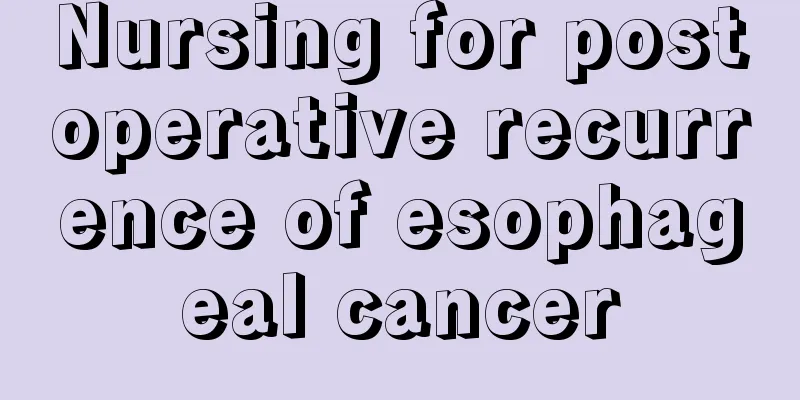Nursing for postoperative recurrence of esophageal cancer

|
Speaking of esophageal cancer, I believe many of my friends' faces will change. It is one of the common digestive tract cancers in our daily life. Since we have this disease, we must actively treat it and not treat it with a negative attitude. Whether it is surgery or Chinese medicine conditioning treatment, dietary care is crucial. Let's listen to the introduction below. 1. Keep the gastrointestinal decompression tube unobstructed: A small amount of blood drained out 24 to 48 hours after surgery should be considered normal. If a large amount of blood is drained out, the doctor should be notified immediately. The gastrointestinal decompression tube should be retained for 3 to 5 days to reduce the tension of the anastomosis and facilitate healing. Pay attention to the accurate connection of the gastric tube, firm fixation, prevention of dislocation, and smooth drainage. 2. Observe the amount and nature of chest drainage: If abnormal bleeding, turbid fluid, food residues or chyle are found in the chest drainage fluid, it indicates active bleeding, esophageal anastomotic fistula or chylothorax in the chest cavity. Appropriate measures should be taken to make a clear diagnosis and treat it. If there is no abnormality, the drainage tube should be removed 1 to 3 days after surgery. 3. Control diet: The esophagus lacks a serosal layer, so the anastomosis heals slowly. Strictly fast and abstain from water after surgery. During the fasting period, intravenous fluids are replenished daily. On the 5th day after surgery, if there is no special change in the condition, milk can be taken orally. If there is no adverse reaction, the amount can be increased day by day. On the 10th to 12th day after surgery, a semi-liquid diet without residue should be adopted, but care should be taken to prevent eating too fast and excessively. 4. Observe the symptoms of anastomotic fistula: The clinical manifestations of esophageal anastomotic fistula are high fever, rapid pulse, dyspnea, severe chest pain, unbearable pain; low breath sounds on the affected side, dull percussion sound, elevated white blood cells and even shock. Treatment principles: ① Drain the pleural cavity to promote lung expansion; ② Choose effective antibiotics to fight infection; ③ Supplement adequate nutrition and calories. 5. Auxiliary treatment: You can take red ginseng, ginsenoside Rh2 and other Chinese medicines to replenish vitality according to your own situation. Taking them after surgery can increase white blood cells, accelerate body recovery, relieve patient pain, prevent recurrence and metastasis, and improve the quality of life. If you or your family and friends suffer from esophageal cancer, whether you have undergone surgery or not, you must take good care of postoperative dietary care. This is very important. The above introduction is the relevant content of dietary care after esophageal cancer surgery. I hope it will be helpful to you. |
<<: What foods can prevent and treat esophageal cancer
>>: What to do if lung cancer recurs
Recommend
There are 7 ways to moisturize dry and flaky skin
When it comes to the topic of dry and flaky skin,...
How is ovarian teratoma formed
How does an ovarian teratoma develop? Mature tera...
Four major methods of radiotherapy for nasopharyngeal carcinoma!
Because the nasopharyngeal cavity is deep and nar...
How to make a cake with butter
Cake is a kind of pastry food that many people li...
What causes painful breast lumps?
Breast lumps are painful, and the symptoms and ch...
What foods can supplement iron
People's bodies need iron to maintain the act...
These Chinese patent medicines can treat insomnia
Insomnia is a very troubling thing. How to treat ...
What to do if Helicobacter pylori is seriously positive
Helicobacter pylori is a very common pathogen. Th...
How many yards is a foot 20cm long
When we buy shoes, we always say the size, size 3...
What factors affect the life expectancy of glioma patients
Glioma is a very rare tumor. Although it rarely b...
Can Jiaogulan and Chrysanthemum be soaked together?
Gynostemma pentaphyllum is a relatively common me...
How to make delicious mulberry leaves
I believe many people are familiar with the mulbe...
How to remove oil stains from clothes
Clothes may be clean, but if they are stained wit...
How many times a year is it appropriate to cupping
Cupping is an effective way to eliminate moisture...
My ears are a bit deaf lately, what should I do?
Hard of hearing is not a good sign. This conditio...









